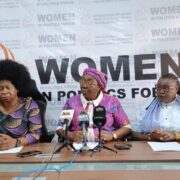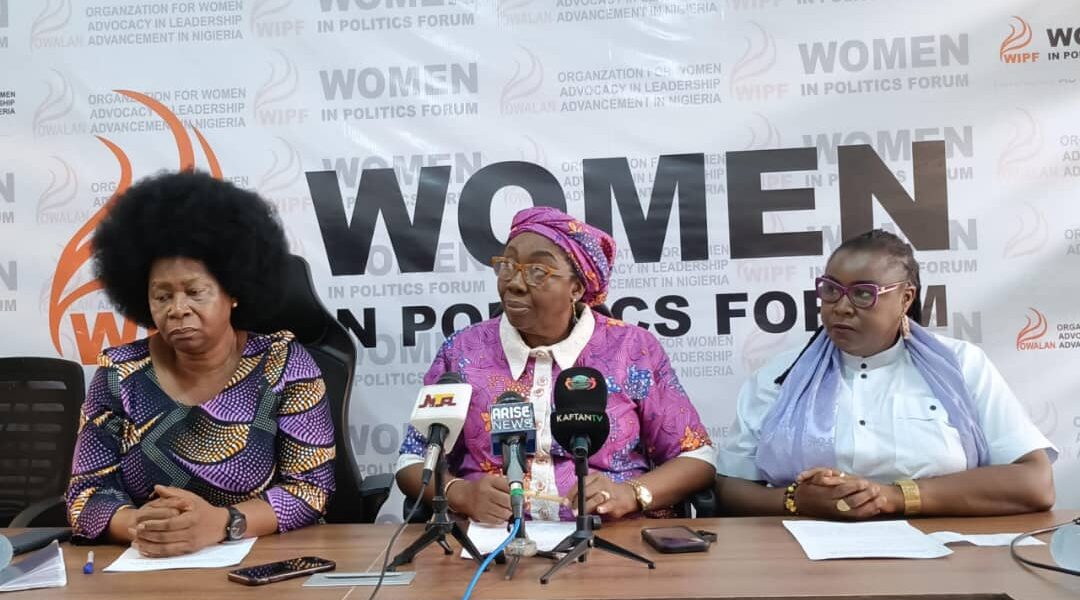As Nigeria celebrates another Democracy Day (May 29) the Women in Politics Forum (WIPF) has expressed concerns regarding the persistently low representation of women in governance across Nigeria, a figure it maintained, remains an impediment to national development.
The organization called for passage of the special seats bill to address existing gender disparity in governance and leadership positions, saying that the full participation of women is an indispensable pillar of a thriving democracy.
National President of the Women in Politics Forum Ebere Ifendu, , made the plea in Abuja during a press briefing to spotlight a transformative legislative initiative: the Special Seat Bill.
“This groundbreaking proposal is not merely an adjustment within Nigeria’s legislative framework; rather, it embodies a historic opportunity to bridge the significant gender gap in the nation’s governance system and amplify the voices of women in critical decision-making roles,” she said.
According to Ifendu, the nation stands at a pivotal moment in its shared commitment to achieving gender equality and revitalizing its democracy. She maintained that the full participation of women in governance is an essential pillar of a truly thriving democracy.
“The statistics we face are not just numbers; they are a sobering reflection of the entrenched inequities that persist within our political landscape,” Ifendu stated.
“Currently, women occupy only 19 of the total 469 seats in the National Assembly—4 in the Senate and 15 in the House of Representatives—resulting in a mere 4.05% of legislative representation in Nigeria.”
This stark reality, Ifendu highlighted, places Nigeria significantly below the global average of 26.5%, illustrating a critical disparity that demands urgent redress. Furthermore, she pointed out that Nigeria ranks a disheartening 178 out of 182 countries in the Inter-Parliamentary Union’s (IPU) global standings for women in national parliaments. This ranking, Ifendu asserted, clearly highlights the systemic barriers that have long stifled the voices of women in governance.
“This alarming reality serves as a clarion call for immediate and collective action, urging us to unite in the pursuit of meaningful change,” Ifendu declared.
“The Special Seat Bill, currently under consideration in the National Assembly, emerges as a bold and necessary response to rectify this historical inequity by reserving dedicated seats explicitly for women within legislative chambers.
Ifendu noted further that the bill is spearheaded by the Deputy Speaker of the House of Representatives, Rt. Hon. Benjamin Kalu, alongside a dedicated coalition of lawmakers who are resolute in their mission to advance gender equality in Nigeria. The Special Seat Bill seeks to create an additional 74 federal legislative seats and 108 state assembly seats specifically for women.
“This is not merely a numerical increase; it is a transformative step toward achieving equitable representation that aligns with the principles of democracy,” Ifendu asserted.
Importantly, this bill includes a sunset clause that mandates a comprehensive review every 16 years, reinforcing the commitment to ensure its impact remains relevant, effective, and responsive to the dynamic needs of Nigeria’s ever-evolving society.
The journey of the Special Seat Bill, Ifendu elaborated, is rich with historical significance and advocacy. Initially introduced in the 9th National Assembly by the formidable Hon. Nkeiruka Onyejeocha, in collaboration with a coalition of 85 lawmakers, including the distinguished former Speaker, Rt. Hon. Femi Gbajabiamila, the bill exemplifies a collective ambition for true gender equality.
Although it faced formidable obstacles and ultimately fell short in its most recent vote in March 2022, “the bill stands as a testament to the relentless push for women’s rights and representation within our political framework,” Ifendu noted.
In response to concerns regarding the fiscal implications of increasing the number of legislative seats, Ifendu explained that the revised proposal has been meticulously crafted to demonstrate that enhancing representation is not a financial burden. The anticipated cost of implementing this bill, she revealed, would be less than 1% of the annual national budget, “a figure that illustrates a responsible approach to governance that champions equity without compromising our fiscal integrity.”
Should this transformative bill pass, Ifendu affirmed, it would not merely amend the Constitution; it would signify a profound shift in the legislative landscape, ensuring that the voices of women are both recognized and integrated into the core of power structures. This initiative, she added, not only aims to elevate women but also seeks to uplift other historically marginalized groups, striving for a legislative environment that genuinely reflects the rich diversity and complexity of the nation.
She reiterated the dismal current statistics: a mere 3 women serve in the Senate (though currently one is on suspension, a situation the WIPF is actively addressing and calling for resolution), 14 in the House of Representatives, and only 48 in State Houses of Assembly.
This is a haunting reminder of the systemic barriers that impede women’s access to political influence.” Nigeria’s alarmingly low ranking of 179 out of 183 countries regarding women’s representation, she stressed, accentuates the imperative for decisive, impactful action to ensure that women’s voices are woven into the legislative fabric where they rightfully belong,”she lamented.
For years, advocates have passionately pursued a 35% affirmative action policy in political positions; however, the road to its implementation has been fraught with challenges and resistance. “Now, more than ever, we must galvanize our efforts toward innovative solutions that create a clear and viable pathway for women to attain their rightful place in the halls of governance,” Ifendu urged.
She stressed the need to confront the entrenched barriers that hinder women’s access to political office. “The notion of achieving equality for women within our current electoral landscape often feels like an elusive dream,” Ifendu admitted. Therefore, she advocated, “our focus must pivot towards empowering women through innovative legislative measures, such as the Special Seat Bill, which holds the promise of ushering in impactful and lasting change.”
The growing support for this bill from prominent figures, including Senate President Godswill Akpabio, Ifendu highlighted, “is not merely a hopeful sign; it is a potent affirmation of our collective commitment to prioritize women’s representation in our nation’s legislature.” This endorsement, she emphasized, ignites a renewed sense of urgency in the WIPF’s mission, propelling them to advocate fervently for this critical adjustment in Nigeria’s governance landscape.
Ifendu urged the media to leverage its influential platform to amplify awareness and advocacy for the Special Seat Bill, “ensuring that this essential issue resonates deeply within the hearts and minds of our citizens.”
“The inclusion of women in decision-making roles, she concluded, transcends mere statistics; it embodies a vital commitment to ensuring that gender-related issues are prioritized and effectively addressed within the framework of Nigeria’s governance.
“As we gather in this transformative moment, let us unite with unwavering resolve to champion inclusivity and drive historic change,” Ifendu concluded.
In her remarks, Renowned Gender Activist Ene Obi noted that the full participation of women in governance is an essential pillar of a thriving democracy, expressing worry on the abysmal low number of women representation in governance
“The statistics we face are not just numbers, they are a sovereign reflection of the entrenched inequities that exist within our political landscape. Currently, women occupy only 19 of the total 4696 seats in the National Assembly, four in the Senate and 15 in the House of Representatives. This is poor, ” she said.
Also speaking, Chizoba Ogbeche, National Vice President of the Nigerian Association of Women Journalists (NAWOJ) Zone D, provided insights into the ongoing grassroots campaign by NAWOJ stepping down the advocacy. She addressed misconceptions that the bill is for elitist women assuring that it is for all women irrespective of party affiliation or ethnicity as it is aimed at uplifting the living of all women.


